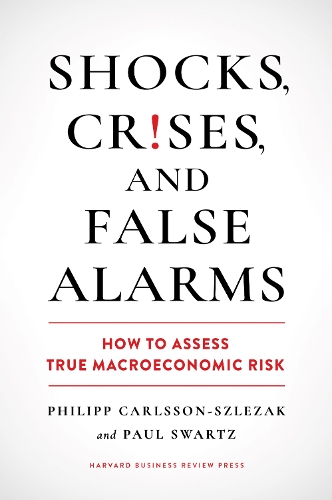
Shocks, Crises, and False Alarms: How to Assess True Macroeconomic Risk
(Hardback)
Publishing Details
Shocks, Crises, and False Alarms: How to Assess True Macroeconomic Risk
By (Author) Philipp Carlsson-Szlezak
By (author) Paul Swartz
Harvard Business Review Press
Harvard Business Review Press
16th October 2024
United States
Classifications
General
Non Fiction
Finance and the finance industry
International economics
Macroeconomics
Risk assessment
339
Physical Properties
Hardback
320
Width 155mm, Height 235mm
Description
An essential new guide to navigating the turbulent macroeconomic landscape as you form your strategy.
War. Inflation. Recession. Pandemic. The semblance of macroeconomic stability is long gone, with the volatility of recent years challenging leaders and companies to preserve and create value as they navigate the business landscape.
When turmoil hits, executives and investors face notoriously unreliable macroeconomic forecasts, whipsawing data, and contradictory opinions. Are disruptions transient and ephemeralor permanent and structural False alarms are costly traps, but so are true structural changes that go undetected. Leaders must also assess the doom-laden public macroeconomic discourse, which habitually presents worst-case scenarios as foregone conclusions.
How can executives avoid these traps and make better strategic decisions In this incisive, perspective-shifting book, BCG Global Chief Economist Philipp Carlsson-Szlezak and Senior Economist Paul Swartz provide a fresh and accessible way to analyze and understand the macroeconomywhat they call "regime analysis"that pushes beyond conventional model-based prediction to emphasize structural context and judgment. Focusing on what it takes for macroeconomic regimes to break, they apply their approach to key risks in the real economy, financial structures, and geopolitical arrangements to help senior executives and investors assess the true risks of their economic context and to build their capacity to respond to changing conditions more effectively.
With rational optimism rather than gloom, Shocks, Crises, and False Alarms speaks to the key macro debates and controversies that shape our time, and it empowers leaders with the analytical skills to assess and judge macroeconomic risks for themselves, with a new way of thinking that will continue to apply as risks change over time.
Author Bio
Philipp Carlsson-Szlezak is Boston Consulting Group's Global Chief Economist and a managing director and partner in the firm's New York office. He was previously chief economist at Sanford C. Bernstein and, earlier in his career, advised financial institutions and governments at the Organization for Economic Cooperation and Development (OECD) and McKinsey & Company.
Paul Swartz is Senior Economist and executive director at BCG. He coleads the Center for Macroeconomics at the BCG Henderson Institute. Paul previously worked at Sanford C. Bernstein, Goldman Sachs, the Council on Foreign Relations, and Bridgewater Associates.
Connect with the authors on bcg.com and LinkedIn.
